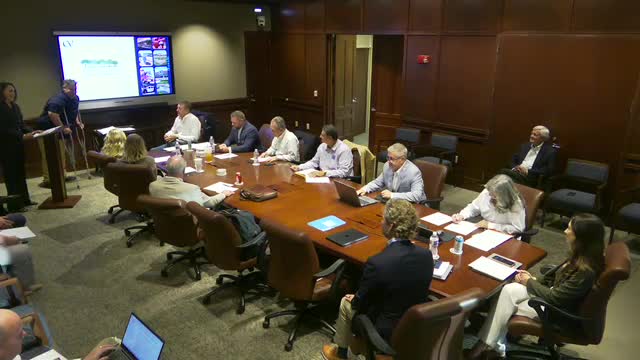Colleyville staff outline 'Texas Tree Trail' behind senior center; council asks for formal proposal
Get AI-powered insights, summaries, and transcripts
Subscribe
Summary
City parks staff presented a plan Oct. 21 to establish a themed tree installation behind the Colleyville Recreation Center and Senior Center, proposing more than 200 trees, phased irrigation work and an initial CIP allocation; council asked staff to return with a formal proposal and to seek council approval for work or purchases exceeding $50,000.
City parks staff on Oct. 21 presented a design for the Texas Tree Trail, a multi‑phased tree‑planting project on roughly nine acres of open space behind the Colleyville Recreation Center and Senior Center.
The proposal, presented by Lisa Escobedo, director of parks and recreation, and Joe Flynn, the city's beautification supervisor, envisions a half‑mile multiuse trail, themed “tree museum” plantings with more than 200 trees across more than 40 varieties, and interpretive elements. Escobedo said the site includes a World War II memorial, an existing practice backstop and a satellite tower, and lies adjacent to OC Taylor Elementary School and Fire Station 2.
The tree board — an advisory board reconstituted in November 2024 — recommended concentrating plantings in the open space behind the senior center, Escobedo said. The board includes one city‑council member, Deputy Mayor Pro Tem Scottie Richardson, one member from the Parks and Recreation Advisory Board, John Billibrand, one resident (Tom Moore, who attended the meeting) and a currently vacant city arborist seat.
"This board was originally established in December 1998," Escobedo said. "They were charged to establish tree installation and maintenance standards, develop the parkway tree grant program and evaluate where the city should be adding trees within city parks." Flynn described the design as an educational, park‑like experience: "There's over 200 trees on this design that we're gonna install over a period of time," he said, and listed specimen types including Mexican buckeye, golden rain tree, dogwoods, redbuds and magnolias.
Staff described the phasing and infrastructure work. The first phase would focus on irrigation and foundation trees; Flynn said the project would rely on bubblers, compost and mulch beds, and that larger shade trees would be planted at roughly 4–5 inch caliper where noted. Blooming trees would be planted in larger 45–65 gallon containers because they establish faster, Flynn said. Escobedo told council the first phase of irrigation was priced at about $4,500.
Finance and timeline details discussed at the meeting included a current CIP line of $125,000 and staff estimates that installation under an aggressive schedule could be completed in roughly three years, with a more conservative three‑to‑five year rollout depending on annual CIP allocations. One council member estimated a total buildout cost of about $500,000; staff responded the city could reduce costs by installing irrigation and planting with in‑house crews and staging purchases to make the work fit annual budgets.
Staff also discussed fundraising and donations. Escobedo said the city already takes optional water‑bill donations for projects such as the library and that a similar $2 donation option could be added to support the tree trail; she said donor funds would be run through the city's budget process.
Council asked clarifying questions about planting specifications, maintenance and phasing. Council asked staff to prepare a formal proposal, including specifications and pricing, and to present it to council; staff said any portion of the project or purchase that exceeded $50,000 would come back to council for approval and that staff could proceed internally for components under that threshold. Escobedo said if the council wanted staff to move forward, staff could begin tree acquisition and installation this coming winter.
Next steps: staff will prepare a formal project proposal, with specifications and pricing, and return to the council for approval as required by the city's procurement thresholds.
